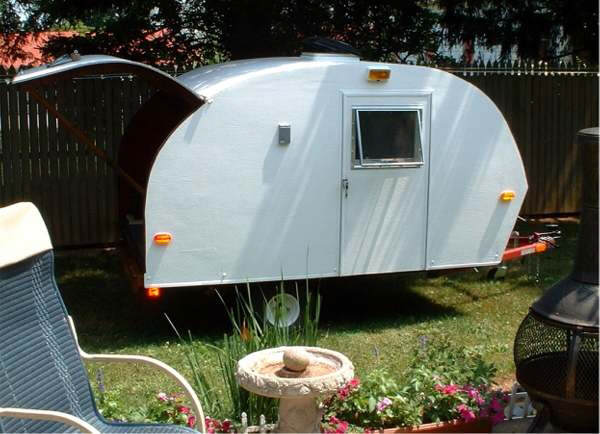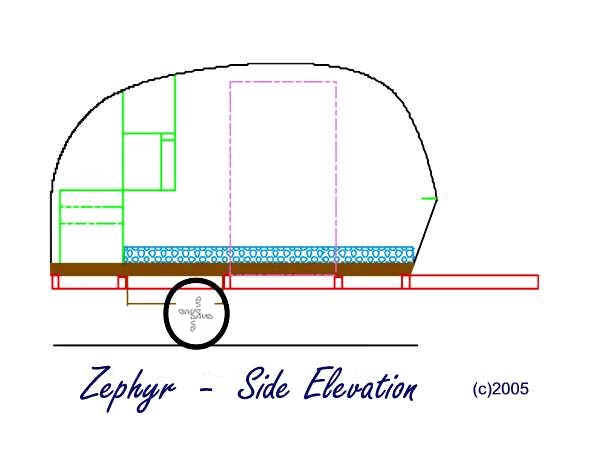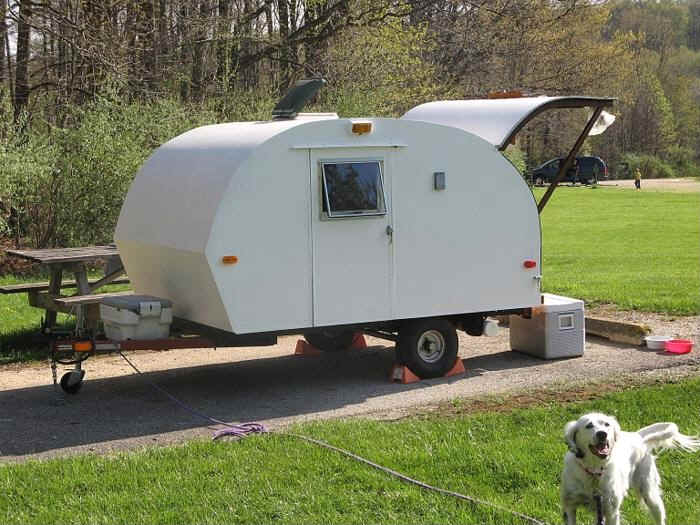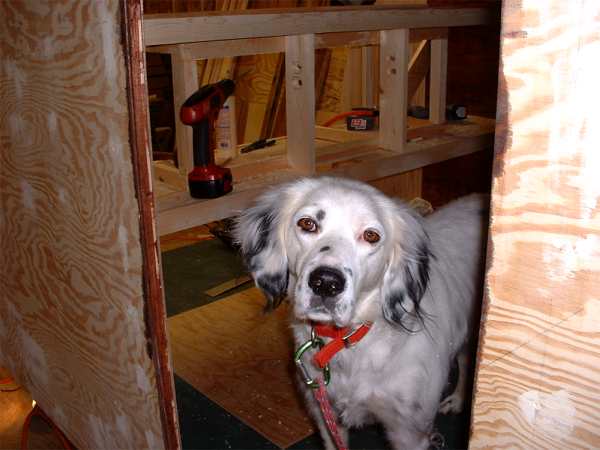

© 2004, 2005, 2006, 2007 by Man of the Cloth Productions
Disclaimer Specifications Pictorial Summary
Trailer Deck Frame Walls Matching the Sides Interior Walls Roof Support
Cabin Ceiling Galley Bulkhead Electrical Exterior Roof
Hatch Galley Door & Windows Cabin Details Tools & Materials
LED Reading Light 12 v DC Panel Meter 12v DC Power Supply
Forum Other Teardrops My Other Designs Vintage Examples Links

I have enjoyed tent camping for some time. I like cooking and being outdoors. But getting off the ground, out of the dampness and into a real bed has looked better with each passing year.
While surfing the web, I first learned about Teardrop trailers. The Teardrop is a compact travel trailer, consisting of a sleeping cabin and a kitchen galley compartment under a hatch in the back. The sleeping cabin is usually large enough for two people. The kitchen area usually includes a stove, cooler, and cooking gear. Teardrops were popular in the 1930’s- 40’s and have recently been regaining popularity. The first Tears were homebuilt. Then a few companies began to manufacture these tiny trailers. Some say these small campers were the start of the RV camping industry. A few of these vintage Teardrops are still around and are being restored by hobbyists. Searching the Internet yields interesting bits and pieces of the history of these tiny trailers.
No two Teardrops are
exactly alike. Many of the first Teardrops were 4' high and 8' long, since
they were based on a standard piece of plywood. Copies of drawings
and articles about Teardrops from hobby magazines of the 1940 era can be found on
the Internet.
After designing several layouts I came up with my version of a Teardrop. I called it the Zephyr, naming it after a light summer breeze.
The Zephyr includes the features I wanted: a bed close to queen size, two doors, ample head room, adequate storage, nice wood work, insulated walls, 12 volt DC lights, an AC connection to shore power, AC power outlets, an AC-to-DC power converter, convenient shelving, and a simple outdoor kitchen galley. The point at the front of the Zephyr is my signature design element. Most Teardrops are rounded at the front to look like an aerofoil. This trailer is not designed to be towed at high speeds. But I think the point suggests speed and looks like it cuts the wind. The point at the front of the Zephyr may be impractical or even a hazard, but I like it, so I built it this way.

I used a free version of TurboCAD to work up the measurements for this layout. The actual drawings I made with the CAD program are more detailed and refined than the simplified one I have here for viewing on the web.
The site that was most helpful to me was Teardrops and Tiny Trailer Forum. Practical information is posted there.
I am an amateur builder. Being an amateur means there is probably someone else who has a better idea or a way to improve what I have built. It also means the Build Journal you are reading is not intended to provide exact or complete step-by-step information for others to duplicate what I have done, or to successfully build a camper based only on the information I provide. The Build Journal tells the story of what I did to construct my tiny camping trailer. View a quick photo tour slideshow of how I built my Teardrop.
Can the ideas found in my design be modified? Yes, most of the design concepts of a Teardrop were not original with me. The idea of a common bulkhead that provides storage for both the indoor sleeping cabin and the outdoor galley is the core of most Teardrops. There are many variations on this theme. Much of my enjoyment came from deciding what I wanted in a camper and then building my own design. I found satisfaction as an amateur builder not in perfect carpentry, but in having the confidence to successfully build something that pleased me. This publication tells how I made a tiny camper that meets my camping needs. If this Build Journal introduces you to Teardrops, inspires you to try your hand at designing your own camper, or building a camper that meets your needs, then this little journal has served its purpose. I hope you enjoy reading it.

Many
thanks to Dan “the better Man,” a generous neighbor who made me laugh and
who taught me it doesn’t have to be perfect. I am also grateful to Tim, in law
enforcement, for sharing his many power tools and his excellent advice as a
carpenter. You kept my project square and true.
Thanks to Mike and everyone at the Teardrop & Tiny Trailer Forum.
I wouldn’t have even attempted this without the information on the
forum. I am most grateful to Chris for supporting me when I first
came up with this idea, for encouraging me as I built the Zephyr, and proofreading
the Build Journal.
Thanks to Nellie for always being willing to go to the shed with me.

Building my own camping trailer was a satisfying hobby. I recommend the experience to others who enjoy the outdoors and who have basic wood working skills. However, anyone attempting to build a trailer must remember there are inherent risks when using power tools. Always wear protective gear and follow manufacturer’s safety instructions. A finished camper must be road-worthy, safe and in full compliance with all laws. For answers to any questions about safety, consult with a mechanic who is certified to inspect trailers for road-worthiness. Talk to an electrician about NEC compliance issues.
Neither the publisher nor the author assumes any responsibility for errors, inaccuracies, omissions or information that may be deemed inconsistent. If anyone uses this information to build a tiny trailer, the user assumes full responsibility for applying this information. The user is also responsible for verifying all aspects of safety and compliance with State and Federal transportation laws.
See my Disclaimer.

My Ashiko Handmade Rhythm Drum
© 2004, 2005, 2006, 2007 by Man of the Cloth Productions
Please visit this sponsor